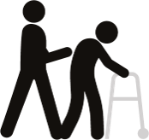Stay HEALTHY - Stay HAPPY - Stay SAFE
-
The Rules
It is important that the advice given by the Government, local health agencies and recognised charities such as Age UK, NICHS (Northern Ireland Chest Heart and Stroke) and the British Heart Foundation is adhered to.
This advice applies to EVERYONE in Northern Ireland, but most importantly to those members of society aged 70 or over - or those aged 70 or over, or younger - with underlying health issues. Ask friends, family and neighbours to support you with essential supplies such as food and medicine. If you are self-isolating because you or someone in your household has coronavirus symptoms or you have been identified on medical grounds as ‘extremely vulnerable’, then you shouldn’t be leaving the house.
COVID-19 is a new illness that can affect your lungs and airways. It's caused by a type of virus called coronavirus.
Everyone should do what they can to stop coronavirus spreading. The best way to do this is to stay at home:
- only go outside for food, health reasons, work (but only if you cannot work from home) or one form of exercise a day, for example a run, walk, or cycle - alone or with members of your household;
- if you go out, stay 2 metres (6ft) away from other people at all times;
- avoid non-essential use of public transport, varying your travel times to avoid rush hour, when possible;
- do not meet with friends and family – keep in touch using remote technology such as phone, internet, and social media;
- use telephone or online services to contact your GP or other essential services;
- wash your hands well and often, and avoid touching your face
You can spread the virus even if you don’t have symptoms.
Download the COVID-19-NI app for more advice and information. To download this app just search for COVID-19-NI on your Apple app store or Android google play store.
- Hygiene Matters
Good hygiene practice remains the best means of avoiding infection
- Wash your hands thoroughly with soap and water (for at least 20 seconds). This applies if you have gone to get groceries or touched anything that anyone else could have touched, for example your bin, a fuel pump, communal door handles.
- Practise social distancing (remain 2 metres away from others)
- Avoid touching your eyes, nose and mouth
- Practice cough and sneeze hygiene – covering your mouth and nose with your bent elbow or tissue when you cough/sneeze. Remember to dispose of the tissue immediately

- Eat Well
People should pay extra attention to their dietary needs at this time and ensure that they get all the minerals and vitamins required for health. Good nutrition is crucial for keeping our bodies and minds healthy. Having fewer fresh foods readily available can make it difficult to eat a healthy and varied diet. It can also potentially lead to an increased consumption of processed foods, which tend to be high in fats, sugars and salt. Here are some tips and suggestions to help you eat a healthy balanced diet at this time.

- Be strategic about the foods you buy and plan your meal choices wisely. Making a list of the foods you already have in the house will help you to plan what food you need, what is essential and avoid food waste.
- Use fresh ingredients and those that have a shorter shelf life first. Frozen fruits and vegetables can be used over longer periods of time. To avoid food waste, consider using any leftovers for another meal.
- Why not try those recipes you have been thinking about. Many healthy and delicious recipes can be found online. Our nutrition team at the Centre for Public Health have developed some healthy eating recipe booklets which you may find useful. See our 'Menu and Other Information' Section.
- It can be challenging to rustle together nutritious dinners so why not experiment with tasty ingredients. Spices, sauces and trying new meals can help to liven up your meals. You might also find ‘Daily Kitchen Live’ interesting television viewing. The team will be conjuring up quick and simple recipes from basic ingredients you may have in your cupboard. You can view it each weekday at 10am on BBC One from Monday 13th April 2020
- If you’re finding cooking a challenge, buy in a few ready meals, it’s better to eat something than nothing. A lot of butchers and supermarkets now prepare full dinners that just need reheated.
- Get your food delivered – many local butchers, greengrocers and supermarkets are doing home deliveries. Phone them up, tell them what you need and they will deliver the food to you. You can pay for the delivery over the phone.
- It may be harder to get regular supplies of fresh fruit and vegetables so keep a few bags of frozen fruits and vegetables in the freezer. Frozen berries are useful and you can use them in a crumble, add to a smoothie or mix with yoghurt.
- If you are freezing food
- freeze fresh or frozen food as soon as it has been delivered
- REMEMBER.. hot food should not be frozen until it has properly chilled down
- You might want to divide the food into smaller portions before freezing
- Once food has been defrosted you should use it that day
- Vitamins and Nutrients
Currently there is no convincing evidence that any food or dietary pattern can ‘boost’ your immune system and prevent or treat COVID-19. Similarly there is no dietary supplement that will prevent you from catching COVID-19.
HOWEVER
- Several nutrients (for example copper, folate, iron, selenium, zinc and vitamins A, B6, B12, C and D) play an important role in the normal functioning of our immune system and therefore the general advice is to eat a healthy balanced diet - rich in fruits and vegetables. Limit your intake of foods high in salt, sugar and fat and try to choose whole grains rather than refined foods.
- Don’t forget your fluid intake. Staying hydrated is important. The World Health Organisation recommends drinking water instead of sugar-sweetened beverages. There's no consistent evidence that caffeine-based drinks are less effective at hydrating people, so drink regular cups of tea and coffee, or sip water and other drinks throughout the day.
- Limit or avoid alcoholic beverages.
- Take a vitamin D supplement – being housebound puts you at increased risk of vitamin D deficiency. A recent report based on over 10,000 people investigated Vitamin D was shown to have a protective effect against cold, flus and chest infections when it was given daily or weekly to people with low vitamin D levels. Another more recent report based on 21,000 participants showed that those with a low blood vitamin D level had a 64% increased risk of community acquired pneumonia. Current guidelines advise those over the age of 65 to take 10 micrograms (400 IU) of vitamin D each day as a supplement. A supplement containing 15-20 micrograms (800-1,000 IU/day) of vitamin D is recommended for most at risk groups especially those who are housebound (due to illness or quarantine for an extended period). You can buy vitamin D supplements from most pharmacies and also some larger supermarkets.
There is currently a lot of misleading information about the foods we should be eating for COVID-19 so the British Dietetic Association have released the following document which you may find useful:
- Your Mind Matters
Go on a ‘news diet’: Stay informed and know what’s going on but limit the amount of information you read on the news and social media. Don’t get locked into endlessly watching every news bulletin. Typically, not much changes hour to hour and too much can cause needless anxiety. Try doing the following: Watch a news update in the morning, then check in again at night, 30 minutes or an hour is plenty.
- Think positive and keep anxiety under control – don’t let your thoughts spiral out of control
- Keep busy: do puzzles, crosswords, draw, paint, bake, read, board games
- Watch a favourite movie, listen to your favourite music
- Focus on what you can control:
- Wash your hands
- Stay away from anyone with symptoms of COVID-19 or who is sick
- Avoid touching your face
- Meditation and deep breaths can help you remain calm

-
Keep in Contact with Family and Friends
Stay in touch with the people close to you, especially those who are social distancing too or even call someone you haven’t spoken to in a while. Social distancing does not mean social isolation. This virus should not force us to feel alone. It’s important to stay connected even if you are at home.
If you are feeling lonely, you could call the following for a chat and for support:
- For practical information and advice, call Age UK Advice: 0800 169 65 65
- For a cheerful chat, day or night, call Silver Line: 0800 470 80 90
- AgeNI are also offering a Check In and Chat Telephone Service (telephone 0808 808 7575) for everyone who is over 60 in Northern Ireland
- COVID-19 Community Helpline is a freephone helpline to help those in vulnerable groups to access information, advice and guidance in relation to COVID-19. The helpline is open 9am – 5 pm seven days a week (telephone 0808 802 0020) and is managed by Advice NI.
- You can also contact them via email (covid19@adviceni.net) or text message (Text ACTION to 81025)

- Keep fit without leaving your home
Take short active breaks during the day
- Aim to get up on your feet at least once an hour
- If you have a garden go for a stroll around it for ten minutes several times each day
- Try some gardening
- Dance to your favourite music e.g. a waltz, a jive
- Age NI has teamed up with Lady Mary Peters to launch an exercise programme aimed specifically at keeping older people moving during the Covid-19 pandemic. Click on the following link to accesss the exercise video https://www.ageuk.org.uk/northern-ireland/information-advice/coronavirus-covid-19/movewithmary/
- AGE UK has also launched a free exercise video appropriate for all older people who want to work out at home which can be downloaded from: generationgames.org.uk
- Joe Wicks has a home workout for older adults: https://www.youtube.com/watch?v=A2wp8Ipxn9s
- Have a look at the 'Top 10 Chair Yoga Positions for Seniors'
- Or if you are feeling particularly energetic - you could try joining our very own Dr Nigel Hart, Queen's academic and GP, in climbing Everest in the month of April from your home or garden - 1000 steps per day will get your there - it dosn't matter if you are only joining today - the month starts when you do! Nigel and the rest of the climbers will wait for you at the top - or - if you find it a bit too tiring - take a rest on a lovely rock and admire the scenery (or a kitchen stool and window will do!) and wait for us to join you on the way down - just be careful and watch your step - if you have walking sticks or poles, these could help your balance - or if on the bottom step of the staircase, hold onto the bannister and/or handrail if you have one:
- join via twitter and follow: @everestinamonth
- join via facebook: https://www.facebook.com/groups/164757471367326/

- Rest
- Sleep is important - make sure you are getting plenty of sleep
- Take regular naps
- Getting enough sleep will help support normal immune functioning
z
z
z z z
z
zzzzzzzzzzz
- Useful Information and Other Sources of Support and Advice
Click on each link below for sample healthy 'Mediterannean' diet meals for breakfast, lunch and dinner.
Here are some some other useful links:
1 How technology can be used to keep people connected - the BBC has a useful article at
https://www.bbc.co.uk/news/technology-519681222 How to keep in contact with people living in care homes - there is some useful information at
https://www.dementiauk.org/helping-families-keep-in-touch-during-covid-19/
3 Advice NI have compiled some information that you may find useful including information relating to benefits, employment, food, heating, medicine and money.
https://www.adviceni.net/coronavirus
4 The Public Health Agency have also further guidance relating to COVID-19 which you may find useful.
Click here for more information: https://www.publichealth.hscni.net/covid-19-coronavirus
- Our Message
Stay Healthy - Stay Happy - Stay Safe